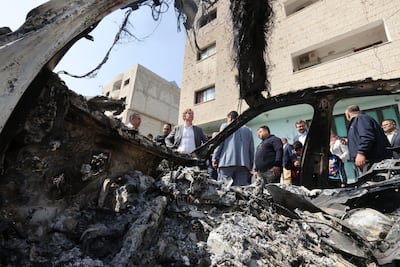Live updates: Follow the latest news on Israel-Gaza
In pitch darkness, two Palestinian men rush towards the sound of running water.
Their worst fears are soon confirmed. Israeli settlers have punctured two massive water tanks that supply their rural community.
They are shouting into their phones and at each other. Water, already in such short supply for Palestinians, spills out on to the dusty ground in two small streams.
Videos like this one, which was taken by residents in the small shepherding community of Khirbet a-Tuba, paint a picture of a grim reality in the occupied West Bank, in which Israeli settlers have increased their attacks on Palestinians and been vandalising their properties.
NGO Comet-ME, which provided the infrastructure damaged in the video, estimates that it has lost as much as €200,000 worth of material since October 7.
"We've had many incidents targeting our water infrastructure, which have a financial cost but also mean that the communities lose thousands of litres of precious water," Tamar Cohen, an employee, explains.
Before the start of the war, the group only documented four cases of settler vandalism since its establishment in 2009.
"The monetary damage to our electricity systems is naturally higher, due to the cost of components," she adds.
The water supply targeted in the video will need to be replaced as soon as possible for vulnerable communities. The money will most likely come from the foreign aid budgets of European countries, who collectively make up the largest bloc of donors to Palestinians.
The flags of the organisation’s three primary donors: the UK, Germany and the Netherlands, fill much of the property. Ireland also contributes to donations here.
The National approached these four donors to get a sense of the extent of damage caused by Israelis.
The Netherlands admitted that a first estimate put the damage to donated infrastructure at the sum of around €150,000.
“The damage to Dutch-funded infrastructure in the Comet-ME project has been regularly on the agenda in talks with the Israeli authorities,” they told The National. The ministry stopped short of saying it will pursue legal action, however, instead confirming it was investigating the incidents, after which it will “consider follow-up steps”.

Ireland revealed that two of its projects with the same NGO had been vandalised since October 7.
While Germany said it has been made aware of "incidents of settler vandalism involving Comet-ME infrastructure”, it did not give an estimate of the damage, nor did it say whether it had raised the issue of vandalism of German-funded Comet-ME infrastructure with Israeli authorities.
The UK did not comment on incidents relating to Comet-ME, but said it “strongly [condemns] the violent acts committed by extremist settlers, which are terrorising Palestinian communities”.
All donors stressed the danger that settler violence poses to the West Bank, and reiterated their commitment to support Palestinians.
But Israeli authorities, who have security responsibility for the area, have taken no steps to stop it, human rights activists say.

“The donors who support these communities are aware of the risks,” Ms Cohen says.
“They understand that the risk that something they fund will be destroyed is far smaller than the risk – for the communities – of not doing anything in the first place,” she adds.
As settler violence, vandalism and theft soar in the West Bank, they will need to keep the funds flowing.
“If we were not to provide electricity, water and internet because we were afraid it would be stolen or vandalised then 10,000 people would be without those services.”
The importance of funding does not however mask a mounting concern within humanitarian circles: that European nations are among Israel’s most vocal supporters on the world stage, even as Israeli authorities appear to do nothing to stop citizens rampaging through the West Bank, destroying western-donated property and terrorising communities that European nations say they are determined to protect.
Larger issue
The situation in the West Bank is close to eruption. An economic crisis in the territory after October 7 is taking its toll. Israeli authorities are stepping up raids, killing and arresting many. The country’s own internal security agency, the Shin Bet, has been issuing increasingly frantic warnings about the security of the West Bank in recent weeks. Israel’s far-right government appears not to be listening.
Israeli human rights activist Yehuda Shaul says the issue goes beyond the existence of violent settlers. “The story is an entire Israeli system that does almost nothing to enforce the law on settlers, basically granting them complete impunity,” he says.
Israeli authorities are not taking any action to halt the violence in the territory, hence the importance of European partners, who, as allies of Israel, should be able to wield some influence, activists say.
Palestinian and Israeli activists have been calling on the international community to use its influence to stop the destruction and rapid depopulation of these areas.

In October, more than 30 human rights organisations and NGOs signed an open letter calling on the international community to stop “the state-backed wave of settler violence which has led, and is leading to, the forcible transfer of Palestinian communities in the West Bank”.
“With grave concern and with a clear understanding of the political landscape, we recognise that the only way to stop this forcible transfer in the West Bank is a clear, strong and direct intervention by the international community. Now is the time to act."
Supporting shepherding communities like the one at Khirbet a-Tuba is one of the most urgent priorities of humanitarian organisations such as Comet-ME and their European donors in the West Bank.
The towns and villages they serve are on the front lines of the battle to keep Palestinians in Area C, a large swathe of land that should, in the eyes of most of the international community, be part of a future Palestinian state.
As settlers permanently displace more and more of them, the possibility of a two-state solution steadily seems to disappear.


